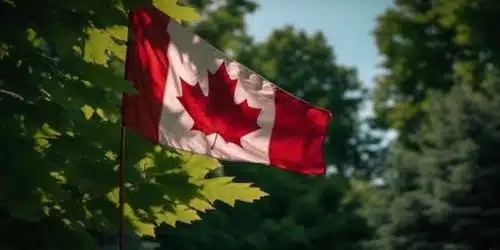The best time to visit Vancouver is subjective and depends on your preferences. If you prefer mild weather and fewer crowds, consider visiting during the spring or fall. If you enjoy warm weather and a bustling atmosphere, summer is the ideal time. Winter is perfect for winter sports enthusiasts. Regardless of the season, Vancouver has something to offer visitors throughout the year. Read on to get a clearer view of the beautiful experience of visiting Vancouver.
Best Time To Visit Vancouver
Vancouver is a beautiful city to visit year-round, but the best time to visit depends on your preferences. Canada offers a range of experiences throughout the year in Vancouver. The best time to visit Vancouver depends on your preferences, such as weather, activities, and crowd levels.
The best time to visit Vancouver depends on several factors including
#1. Spring: March-May
Spring is considered one of the best times to visit Vancouver. The weather is mild, and hotel prices are reasonable. During this time, you can enjoy outdoor activities like hiking and biking. As temperatures begin to rise (averaging in the 50s and 60s), the city starts to bloom. Residents like to kayak in English Bay, stroll through flower beds in Stanley Park, and take part in the numerous special events held throughout town.
#2. Summer: June-August
Summer is the peak tourist season in Vancouver, with warm weather and plenty of outdoor activities to enjoy, such as paddleboarding, whale watching, and swimming. However, it’s also the busiest time, with larger crowds and higher prices. If you don’t mind the crowds and want to take advantage of the best weather, summer is a great time to visit.
#3. Fall: September-November
Fall is another favorable time to visit Vancouver. The weather remains mild, and hotel rooms are more affordable compared to the summer season. This is a great time to explore the city and enjoy outdoor activities before the winter sets in.
#4. Winter: December-February
Winter in Vancouver offers opportunities for winter sports enthusiasts. The city serves as a base for snowboarding and skiing in nearby mountains like Grouse Mountain. Winter clothing is necessary for comfort during this time, regardless of when you arrive. However, temperatures drop and snowfall is expected, so be prepared for colder weather.
What Vancouver Offers
Vancouver offers a wide range of attractions and activities throughout the year.
Here are some highlights of what you can experience:
#1. Outdoor Activities
Vancouver is known for its stunning natural beauty and offers numerous outdoor activities. During the best time to visit, such as spring, summer, and fall, you can enjoy activities like hiking, biking, paddleboarding, whale watching, swimming, skiing, and golfing.
#2. Festivals and Events
Vancouver hosts various festivals and events throughout the year. Some notable events include the Vancouver International Dance Festival, the Vancouver Folk Music Festival, and holiday celebrations during the winter season.
#3. Scenic Beauty
Vancouver is surrounded by breathtaking scenery, including mountains, forests, and the Pacific Ocean. You can explore Stanley Park, visit the Capilano Suspension Bridge, take a stroll along the seawall, or enjoy the views from Grouse Mountain.
#4. Cultural Experiences
Vancouver is a multicultural city with a vibrant arts and culture scene. You can visit museums, art galleries, and theaters, and explore diverse neighborhoods like Gastown and Chinatown. The city also offers a variety of dining options, showcasing its culinary diversity.
#5. Cruises and Water Activities
Vancouver serves as a gateway to the Inside Passage, a scenic waterway between Vancouver Island and the British Columbia mainland. You can embark on cruises to explore this picturesque region, visit ports of call like Juneau and Skagway, and enjoy the calm waters and stunning scenery.
#6. Shopping and Dining
Vancouver is known for its shopping districts, such as Robson Street and Granville Island Public Market, where you can find a variety of shops, boutiques, and local products. The city also offers a vibrant food scene with diverse cuisines and farm-to-table dining options.
#7. Beaches and Parks
Vancouver is home to several beautiful beaches, such as English Bay Beach, Kitsilano Beach, and Spanish Banks Beach. During the summer months, you can relax on the sandy shores, go for a swim, or have a picnic in the nearby parks. Stanley Park, Queen Elizabeth Park, and VanDusen Botanical Garden are also worth exploring for their natural beauty and recreational activities.
#8. Wildlife Viewing
Vancouver is known for its abundant wildlife. In the best time to visit, you have the opportunity to spot various marine creatures, including whales, dolphins, seals, and sea lions. You can take a whale-watching tour or go on a kayaking adventure to get up close to these majestic animals.
#9. Day Trips and Excursions
Vancouver provides easy access to stunning destinations for day trips and excursions. You can visit the charming city of Victoria on Vancouver Island, explore the picturesque Whistler Village and its surrounding mountains, or take a scenic drive along the Sea-to-Sky Highway to enjoy breathtaking views of fjords, waterfalls, and mountains.
#10. Bike Tours and Trails
Vancouver is considered a bike-friendly city with numerous cycling routes and trails. You can rent a bike and explore the city’s neighborhoods and parks on two wheels. The Seawall, a scenic pathway that stretches around Stanley Park, offers breathtaking views of the city skyline and waterfront.
Best Time To Visit Vancouver Island
The best time to visit Vancouver Island depends on personal preferences and activities. Spring offers mild weather and outdoor activities, while summer is popular for its long days and ideal weather. Fall provides mild weather and fewer crowds, and winter is unique with storm-watching and winter sports opportunities.
Tips for Visiting Vancouver Island
#1. Explore Beyond Vancouver Island
While Vancouver Island itself offers a wealth of attractions, consider incorporating it into a wider trip. You can combine a visit to Vancouver Island with a self-drive trip to the Canadian Rockies or explore the Sunshine Coast Highway.
#2. Consider a Road Trip
Vancouver Island is well-suited for road trips, allowing you to explore its diverse landscapes and attractions at your own pace. There are several suggested itineraries available that cover popular destinations like Nanaimo, Tofino, and Port Renfrew.
#3. Be Mindful of Travel Routes
When planning your visit, consider alternative routes to Vancouver Island. BC Ferries offers various options, and traveling as a foot passenger can provide a different perspective and experience.
#4. Pack Accordingly
Vancouver Island’s weather can vary, so it’s important to pack appropriate clothing. Check the weather forecast for the specific areas you plan to visit and pack layers, rain gear, and comfortable footwear for outdoor activities.
#5. Book Accommodations in Advance
Vancouver Island is a popular destination, and it’s advisable to book accommodations in advance, especially during the peak summer season. This will ensure you secure your preferred options and avoid last-minute availability issues.
#6. Consider Seasonal Activities
Depending on the time of year you visit, there may be specific seasonal activities to enjoy. For example, spring offers blooming flowers and vibrant gardens, while winter is ideal for storm-watching along the coast. Research and plan activities that align with the season of your visit.
#7. Be Aware of the Housing Market and Prices
If you plan to stay long-term or rent accommodations on Vancouver Island, be aware that the housing market can be competitive, especially in popular areas like Victoria. Prices for food, liquor, and utilities may also be higher compared to other regions in Canada.
#8. Engage in Outdoor Activities
Vancouver Island is renowned for its outdoor activities. Take advantage of opportunities for whale watching, kayaking, hiking, and exploring the island’s rainforests and beaches. Be sure to follow safety guidelines and respect the natural environment.
#9. Visit the Beaches
Vancouver Island is home to beautiful beaches. Enjoy the sandy shores, go for a swim, or have a picnic in the nearby parks. Some popular beaches include English Bay Beach, Kitsilano Beach, and Spanish Banks Beach.
#10. Respect the Environment
Vancouver Island is known for its pristine natural environment. Practice responsible tourism by following designated trails, respecting wildlife, and properly disposing of waste. Leave no trace and help preserve the island’s beauty for future visitors.
Attractions To Consider When Visiting Vancouver Island
These attractions offer a diverse range of experiences, from natural beauty and outdoor adventures to cultural exploration and historical sites.
Here are some attractions to consider when visiting Vancouver Island:
#1. The Butchart Gardens
Located near Victoria, The Butchart Gardens is a stunning garden with beautiful floral displays, walking paths, and tranquil settings.
#2. Horne Lake Caves Provincial Park
Explore the fascinating underground world of caves at Horne Lake Caves Provincial Park. Take guided tours to witness unique geological formations and learn about the cave ecosystem.
#3. Paradise Acres Ranch
Enjoy horseback riding adventures and explore the scenic landscapes of Vancouver Island at Paradise Acres Ranch.
#4. East Sooke Regional Park
This park offers picturesque coastal trails, beautiful beaches, and opportunities for wildlife spotting. It’s a great place for hiking and nature enthusiasts.
#5. Wild Pacific Trail
Located in Ucluelet, the Wild Pacific Trail offers breathtaking coastal views, rugged cliffs, and old-growth forests. It’s a popular spot for hiking and photography.
#6. Victoria and Butchart Gardens
Take a day trip to Victoria and visit the iconic Butchart Gardens. Explore the capital city of British Columbia, stroll along the Inner Harbour, and discover the historic landmarks and vibrant culture.
#7. Pacific Rim National Park Reserve
Located on the west coast of Vancouver Island, this park offers stunning beaches, rainforests, and opportunities for hiking, surfing, and wildlife viewing.
#8. Royal BC Museum
Located in Victoria, the Royal BC Museum showcases the natural and human history of British Columbia through engaging exhibits and displays.
#9. Cathedral Grove
Visit this old-growth forest in MacMillan Provincial Park and marvel at the towering Douglas fir trees.
#10. Gulf Islands
Explore the picturesque Gulf Islands, such as Salt Spring Island, Galiano Island, and Pender Island. Enjoy the laid-back island vibes, local artisans, and beautiful landscapes.
What Time Of Year Is The Cheapest To Go To Vancouver?
The cheapest time to visit Vancouver is during the winter months from January to March. During this time, the city has the fewest visitors, so hotel and attraction prices are at their lowest. The weather in Vancouver during winter is mild, and snow is pretty rare in the city. The weather begins to warm in February, and the cherry blossoms may even bloom early.
What Is The Rainy Season In Vancouver?
The rainy season in Vancouver is from October to March, with the most rainy days occurring in January, February, March, April, October, November, and December. November is the wettest month on average. The average annual number of rainy days in Vancouver is 171. However, it is important to note that Vancouver has a mild climate year-round, and even during the rainy season, there are still many sunny days.
How Many Days In Vancouver Is Enough?
The ideal duration for a visit to Vancouver depends on personal preferences and the desired activities. While 7 days can be easily filled with activities, 3 days can provide a good introduction to the city. However, more time allows for a more comprehensive exploration. The winter season is generally considered the cheapest time to visit, with milder temperatures and fewer tourists. Nevertheless, the duration of your stay should be based on your interests and the time you have available.
What Is the Hottest Month in Vancouver?
According to the search results, the hottest month in Vancouver is August, with an average temperature of 18°C (64°F). However, Vancouver has a mild climate year-round, and even during the hottest month, temperatures are not extreme. The summer months from June to September are generally warm and dry, with temperatures ranging from the high 60s to low 70s.
Does Vancouver Have Snow?
Yes, Vancouver does have snow, but it is not a common occurrence. The city has a mild climate year-round, and snow is pretty rare in the city. Vancouver’s annual average snowfall total is 262 inches (665 cm), but most days of snowfall in Vancouver leave less than five centimeters (2 inches) of fresh snow on the ground.
Is Vancouver Very Expensive To Live In?
Vancouver is considered one of the most expensive cities in Canada and North America. The cost of living in Vancouver is high, but it is still lower than in other major cities, such as New York City. The average cost of living in Vancouver is $2477 to $2850.85 per month. The cost of living includes housing, utilities, food, transportation, and entertainment.
Conclusion
During spring, summer, and fall, visitors can enjoy a wide range of activities. The city also hosts festivals like the Vancouver International Dance Festival and the Vancouver Folk Music Festival. Vancouver Island’s best time to visit depends on personal preferences and activities. Consider incorporating it into a wider trip, planning a road trip, being mindful of travel routes, packing appropriately, booking accommodations in advance, and considering seasonal activities. Consider incorporating a wider trip, exploring the Canadian Rockies, and planning activities that align with the season.
- TRANS CANADIAN RAILWAY TOURS: Costs & Routes
- NEW YORK IN WINTER: What To Wear & Places To Visit
- Best Time to Visit Hawaii 2023: Best Easy Guide
- Best Time to Visit Greece 2023: Detailed Guide
- 11+ Best Places to Travel in November 2023 (Detailed List)






